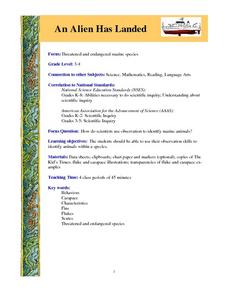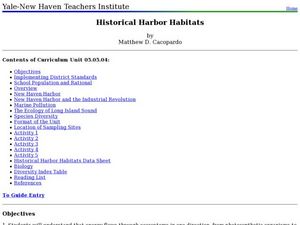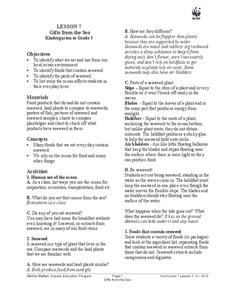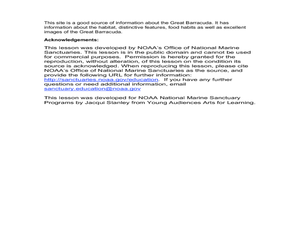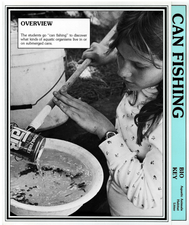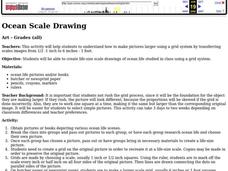NOAA
Journey to the Unknown
Go where no one has gone before. Learners experience what it is like to be a scientist exploring new territory. Using audio and a scripted text, pupils take a trip in the depths of the ocean. They follow their trip with a hands-on...
National Wildlife Federation
Plastic in the Sea
How much plastic do people use? Class members identify how plastic is involved in their daily lives by looking at food packaging either at a grocery store or at home. Learners view statistics for the amount of plastics found on a beach...
Nature Works Everywhere
Fishing for a Future
Teaching a man to fish has an environmental impact. Through a series of four lessons, learners study the science of fishery management. Their study involves analyzing data to develop a management strategy for specific fish and common...
ReadWriteThink
Webcams in the Classroom: Animal Inquiry and Observation
Boost observational skills with an inquiry-based lesson that takes scholars on a virtual field trip. With help from webcams, learners observe animals in a zoo or aquarium. Observations go into a journal and a discussion is held to review...
Aquarium of the Pacific
Kelp Forest Conservation
There otter be a better way. As a class, groups work together to create a food web based on the organisms in the kelp forest. Budding scientists watch a video on the kelp forest to see how the organisms create a food web and hear about...
Bonneville
Design and Engineer Solutions
What's the best way to collect all that trash? A culminating activity has scholars use the knowledge and skills from the unit to design a solution to the plastic trash island problem. They use 3-D pens or a 3-D printer to build models of...
Curated OER
An Alien Has Landed
Students identify animals within a species by using their observation skills to record information, such as behavioral characteristics.
Curated OER
Plot Your Course
High schoolers determine distance and direction on a nautical chart. In this nautical instructional activity, students identify obstacles and characteristics of common aid to navigation on a nautical chart.
Curated OER
Ship of the Line
Students discover boats by researching 18th century ships. In this Naval history lesson, students identify and describe the different components of an 18th century naval ship after researching information on the Internet. Students...
Curated OER
Historical Harbor Habitats
Tenth graders create food web displays in the classroom. In this ecology lesson, 10th graders identify the different pollutants in the environment and their effect on organisms. They collect samples of sediments from the harbor and...
Curated OER
Monitoring Coral Reefs
Students investigate data on coral reef monitoring in a marine protected area in the Florida keys. In this coral reef lesson plan, students use online data from a marine protected coral reef to complete a worksheet about coral...
Curated OER
Blue Planet: Tidal Seas
Students investigate how tides affect sea life. In this video based instructional activity, students view a video on how tides affect sea life. They do web-based research to find the answers to a series of questions and then play Tidal...
Curated OER
Ocean Poster
Students discover ocean life by creating a mural. For this ocean biology lesson, students utilize a computer to find images of the ocean that can be used to create a collage. Students discuss the different images and how the ocean is...
Curated OER
Gifts from the Sea
Students discover the oceanic food chain. In this healthy eating lesson, student investigate the fish we eat and the food the fish eat. Students discover what ocean animals eat seaweed and what everyday foods we eat that also contain...
Curated OER
Schooling Fish
Students make fish models. In this fish behavior instructional activity, students create lanternfish fishsticks, learn how a school of fish live, eat and swim together, examine the predator-prey relationship, and read the book Swimmy to...
Curated OER
The Great Barracuda
Learners explore oceanography by researching the great barracuda. For this animal life lesson, students read several vocabulary terms dealing with ocean life and examine a drawing of a barracuda. Learners examine the many...
Curated OER
Can Fishing
Fifth graders investigate aquatic organisms. In this fishing lesson, 5th graders use can-fishing rigs to observe animals in their natural habitat. Students consider ways to solve a problem and discuss their findings.
Curated OER
No Escape
Via four student handouts, marine biology learners examine the topography and circulation cell of the Fieberilng guyot. Then they examine the number of individual hydroids counted at each depth. Pupils use the information to relate water...
Curated OER
Animal Wordsearch
In this science worksheet, young scholars examine 25 words in a word bank; all are names of fish and sea creatures. Students locate the words in a word search puzzle.
Curated OER
Natural Inquirer
Students interview wildlife experts to gain information needed to research and write a report about an aquatic plant or animal affected by climate change.
Curated OER
Ocean Scale Drawing
Students explain how to make pictures larger using a grid system by transferring scales images from 1/2 -1 inch to 6 inches - 1 foot. They create life-size scale drawings of ocean life studied in class using a grid system.
Curated OER
Collect, organize and compare different data for the Marine Mammals of the Miami Seaquarium, i.e.: size, weight, diet and habitat and how to calculate average, median, mode and range.
Students collect, organize, and compare different data and develop statistical methods such as: average, median, mode and range as a way for decision making by constructing table
Curated OER
Aquatic Organisms
Students create a poster describing the five characteristics of a salt water organism compared to a fresh water organism.
Curated OER
Marine & Aquatic Habitats -- Journey of a Drop of Water Through a Watershed
Students discuss pollution and the steps in the hydrologic cycle. They follow a drop of water through a watershed simulation. They discover the components of a water cleaning system as well.








